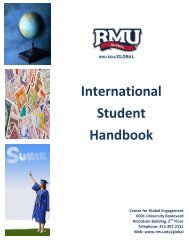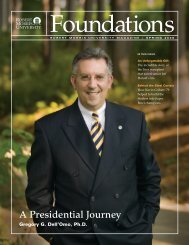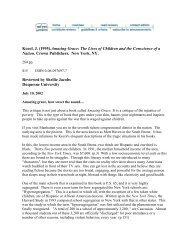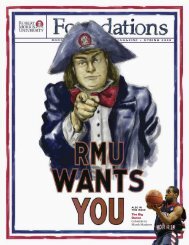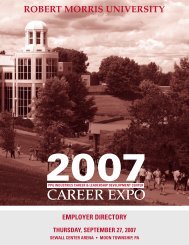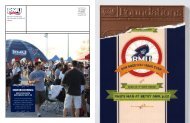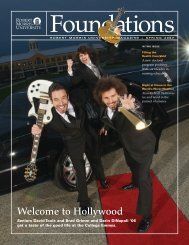Eat Their Dust! - Robert Morris University
Eat Their Dust! - Robert Morris University
Eat Their Dust! - Robert Morris University
- No tags were found...
You also want an ePaper? Increase the reach of your titles
YUMPU automatically turns print PDFs into web optimized ePapers that Google loves.
Barr’s research into the early history of Pittsburgh andthe early American West is extensive. He is the editor ofThe Boundaries Between Us: Natives and Newcomers alongthe Frontiers of the Old Northwest Territory, 1750-1850, ananthology comprised of 11 original essays that presentunique perspectives on the history and significance ofthe contest for control of the Old Northwest Territory.Barr also wrote the book's introduction and one of theessays, “This Land Is Ours and Not Yours,” in whichhe challenges historical characterizations of AmericanIndians as helpless victims. Instead, he depicts theShawnee and Western Delaware as powerful, mindfulparticipants in the struggle for the American frontier.ier“I think we’ve moved toward amore sympathetic view ofAmerican Indians,” says Barr.“This is definitely a step in theright direction. We just have tobe careful not to portray them toomuch as victims. But I think we’vegotten to a point where we’re getting a more accurateportrayal of America’s native peoples.”Barr is also the author of Unconquered: The Iroquois Leagueat War in Colonial America, a narrative overview of nearly200 years of Iroquois conflict during the colonial era thatexplores the complex world of Iroquois warfare. He iscurrently working on his next book, A Colony Sprung fromHell: War and Society on the Pittsburgh Frontier, 1744–1794,due out in 2009, which is a study of the early settlementof the southwestern region of Pennsylvania – what Barrcalls the “Pittsburgh Frontier.” The book’s title comesfrom a quote from Henry Bouquet, a British officerstationed at Fort Pitt in the 1760s, who correctly foresawthe inevitable chaos that was coming as settlers clashedwith Indians.“The major theme of the book is lawlessness and lack oforder,” says Barr. “The Pittsburgh region is really the firstsettlement west of the Appalachians. When this area wasbeing settled, there were really no rules. And what lawsthere were weren’t followed anyway. There was noenforcement, and it was chaotic, violent time.”In March 2008, Barr was awarded the Philip S. KleinPennsylvania History Prize from the PennsylvaniaHistorical Association. The award is given bienniallyto the scholar who writes the best article for theassociation’s journal, Pennsylvania History. Barr earnedthe prize for his article “‘A Road for Warriors’: TheWestern Delawares and the Seven Years’ War,” whichexamined the strategies and motivations behind theDelaware Indians’ decision to fight with the Frenchduring the French-Indian War.Originally from Erie, Pa., Barr attended Slippery Rock<strong>University</strong>, where he earned a bachelor’s in history in1994, and a master’s in history in 1996. He then went onto Kent State <strong>University</strong>, where, in 2001, he earned adoctorate in early American history with a specializationin the American Revolution and American IndianHistory.Barr actually started his undergraduate education atPenn State <strong>University</strong>, where he was studyingarchitectural engineering. After just a year and a half,he transferred to Slippery Rock.“Although I had a great interest in architecture – and stilldo – I realized it just wasn’t for me,” says Barr. He hadalways had an interest in history and, after taking onehistory class, decided to focus his studies there.It was Barr’s grandmother who first got him interested inearly American Indian history. “My grandmother was aDelaware Indian from Oklahoma,” says Barr, “and shelived with us during the last couple years of her life. Shealways impressed on me and my brother and sister howimportant it was to value your heritage. It just didn’treally resonate with me until I got into college.“In the recent past, Native Americanswere depicted as bloodthirsty savages,”says Barr. “But modernassessments of them aremore open-minded.Today there’s more of anattempt to understand theirperspective and what it waslike to be in their shoes.”Barr says that this newattitude towardsAmerican Indiansis a direct effect





